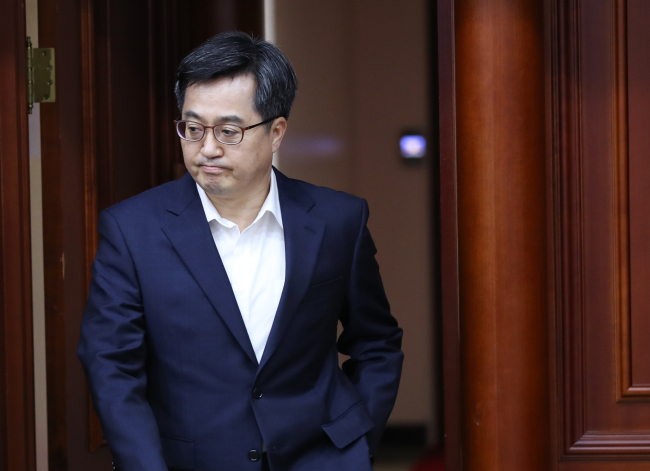S. Korea’s job situation at its worst since post-financial crisis period

Deputy Prime Minister and Finance Minister Kim Dong-yeon attends the meeting of economy-related ministers on Wednesday. (Yonhap)
SEOUL — Amid an ever-worsening job market and lower-than-expected growth, South Korea’s youth unemployment rate reached its highest level since the country’s financial crisis situation in the late 1990s, government data showed Wednesday.
According to a Statistics Korea report on employment trends, the number of newly employed people stood at 26.9 million in August, up 3,000 from a year earlier. This on-year rise was the lowest since the 10,000 decrease recorded in January 2010, when the nation was reeling from the aftermath of the 2008-2009 global financial crisis.
The jobless rate spiked to 1.13 million in August, up 134,000 from a year earlier and reaching its highest level for that month since 1999, when the unemployment rate peaked at 1.36 million amid the Asian Financial Crisis backwash.
Also, this marked eight consecutive months during which Asia’s fourth-largest economy saw a jobless rate of more than 1 million, according to the statistics office.
It was young people between the ages of 15 and 29 who felt the strongest impact. While the nation’s average unemployment rate stood at 4 percent in August, the corresponding figure for those aged between 15 and 29 was 10 percent, up 0.6 percent from the previous month — the highest figure for any August since 1999, when it was 10.7 percent.
Article continues after this advertisementThe manufacturing sector shed 105,000 jobs on-year in August, having declined for the fifth consecutive month, and the retail business also saw a cut of 123,000 jobs.
Article continues after this advertisement“The prolonged slump in the automobile and shipbuilding sectors, which usually have high employment capacities, has exerted an influence on the retail and other related industries,” said an official from Statistics Korea.
Weighed down by the grim figures, Deputy Prime Minister and Finance Minister Kim Dong-yeon vowed to speed up the execution of the government’s 42.9 trillion won budget injection to create new jobs within the year.
Since its inception in May last year, the progressive Moon Jae-in government has so far invested some 54 trillion won to address the nation’s job woes, including a 15 trillion won supplementary budget dedicated to job creation.
“In addition to the (central) government budget, there is also the 42.9 trillion won budget (increase) allocated to local governments,” Kim said. “I will make sure that this amount is (provided) as soon as possible.”
The fiscal policy chief also reiterated his earlier plan to “slow down” the pace of the legal minimum wage hike, viewing it as a negative factor for employment.
“I will start conducting talks with the presidential office and the ruling party in order to establish a reasonable alternative to the (current) wage hike pace,” Kim told reporters after a meeting of economy-related ministers.
“Some policies have had an impact on the economy, despite the good intentions (behind them) and (their positive) direction. One of them is the minimum wage.”